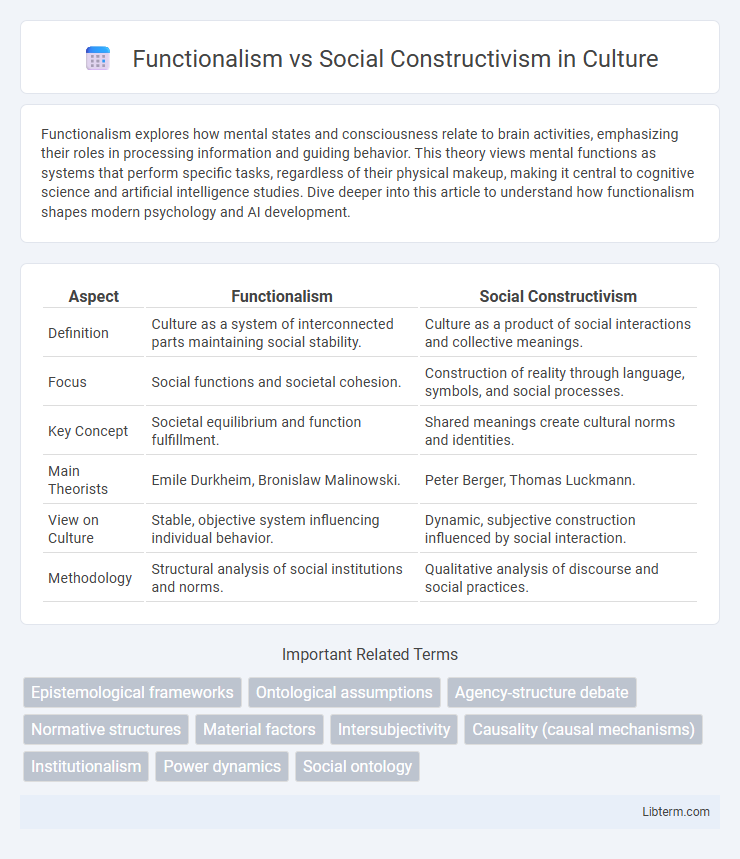Functionalism explores how mental states and consciousness relate to brain activities, emphasizing their roles in processing information and guiding behavior. This theory views mental functions as systems that perform specific tasks, regardless of their physical makeup, making it central to cognitive science and artificial intelligence studies. Dive deeper into this article to understand how functionalism shapes modern psychology and AI development.
Table of Comparison
| Aspect | Functionalism | Social Constructivism |
|---|---|---|
| Definition | Culture as a system of interconnected parts maintaining social stability. | Culture as a product of social interactions and collective meanings. |
| Focus | Social functions and societal cohesion. | Construction of reality through language, symbols, and social processes. |
| Key Concept | Societal equilibrium and function fulfillment. | Shared meanings create cultural norms and identities. |
| Main Theorists | Emile Durkheim, Bronislaw Malinowski. | Peter Berger, Thomas Luckmann. |
| View on Culture | Stable, objective system influencing individual behavior. | Dynamic, subjective construction influenced by social interaction. |
| Methodology | Structural analysis of social institutions and norms. | Qualitative analysis of discourse and social practices. |
Introduction to Functionalism and Social Constructivism
Functionalism views society as a complex system whose parts work together to promote stability and social order, emphasizing the functions of institutions and social practices. Social Constructivism argues that knowledge and meaning are created through social interactions and cultural contexts, highlighting the role of language and shared understanding in shaping reality. These contrasting frameworks offer foundational perspectives for analyzing social behavior and structures.
Historical Origins and Key Thinkers
Functionalism emerged in the late 19th and early 20th centuries, rooted in the works of Emile Durkheim, who emphasized the role of social institutions in maintaining societal stability and cohesion. Social constructivism developed later, influenced by the ideas of Peter Berger and Thomas Luckmann, particularly their 1966 work "The Social Construction of Reality," which argued that knowledge and meaning are created through social interactions. While functionalism views society as an organism with interdependent parts, social constructivism focuses on how reality and social phenomena are constructed through language and shared understandings.
Core Principles of Functionalism
Functionalism centers on the core principle that society is a system of interconnected parts working together to maintain stability and social order. Each institution and structure serves a specific function that contributes to the overall equilibrium, such as the family socializing children or the government enforcing laws. This theory emphasizes the importance of consensus and shared norms in promoting societal cohesion and addressing social needs efficiently.
Foundational Concepts in Social Constructivism
Social Constructivism emphasizes the role of social processes and interactions in the construction of knowledge, asserting that reality is co-created through collective understanding and cultural norms. Key foundational concepts include the importance of language as a tool for meaning-making, the influence of socio-historical contexts on learning, and the idea that knowledge is distributed among communities rather than residing solely within individuals. This contrasts with Functionalism, which views social structures and their functions as objective entities that maintain societal stability.
Methodological Approaches
Functionalism employs quantitative methods such as surveys and statistical analysis to identify social structures' roles in maintaining societal stability and order. Social Constructivism adopts qualitative methodologies like ethnography, interviews, and participant observation to explore how individuals and groups create social realities through interactions. These contrasting approaches emphasize objective measurement versus subjective meaning in understanding social phenomena.
Comparing Views on Social Structures
Functionalism views social structures as stable, necessary components that maintain societal order and cohesion by fulfilling essential functions. Social constructivism argues social structures are created and continually reshaped through human interaction, emphasizing their fluid and subjective nature. While functionalism prioritizes structural roles and systemic stability, social constructivism highlights how meanings and realities are socially produced and contested.
Interpretation of Knowledge and Reality
Functionalism interprets knowledge and reality as objective and measurable phenomena, emphasizing the practical functions that social institutions serve in maintaining societal stability and cohesion. Social Constructivism views knowledge and reality as subjective and co-created through social interactions, highlighting the role of language, culture, and power relations in shaping individuals' perceptions and understandings. This contrast underscores functionalism's reliance on empirical evidence versus social constructivism's focus on contextual meanings in interpreting social phenomena.
Application in Contemporary Social Sciences
Functionalism in contemporary social sciences analyzes social institutions based on their roles in maintaining societal stability and cohesion, emphasizing functions like social integration and order. Social constructivism examines how social realities and knowledge are actively created through interactions, highlighting the influence of culture, language, and power dynamics. Both perspectives offer valuable frameworks for studying education, identity, and organizational behavior by addressing structural functions and meaning-making processes.
Major Criticisms and Debates
Functionalism faces criticism for its tendency to emphasize social stability and cohesion while neglecting social change and conflict, often overlooking power dynamics in maintaining societal structures. Social Constructivism is challenged for its relativistic approach, which can undermine objective reality and scientific explanations by focusing heavily on the subjective nature of knowledge and social context. Debates between these theories center on whether social phenomena are best understood through objective functions and roles or through the meanings and interpretations constructed by individuals and groups.
Conclusion: Bridging Functionalism and Social Constructivism
Bridging Functionalism and Social Constructivism requires recognizing that social structures not only fulfill essential functions in society but are also shaped through human interactions and shared meanings. Integrating these perspectives enhances understanding of how institutional roles maintain stability while evolving through collective agency and cultural contexts. This synthesis provides a comprehensive framework for analyzing social phenomena, balancing structural necessities with the fluidity of social construction.
Functionalism Infographic

 libterm.com
libterm.com